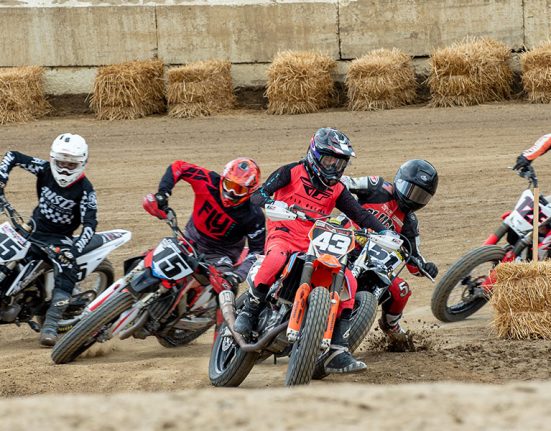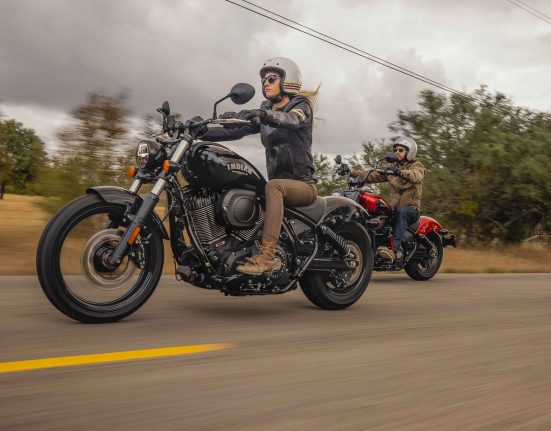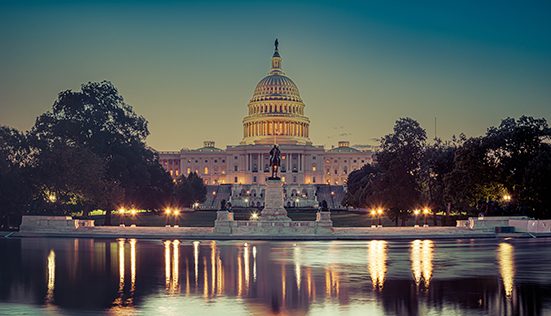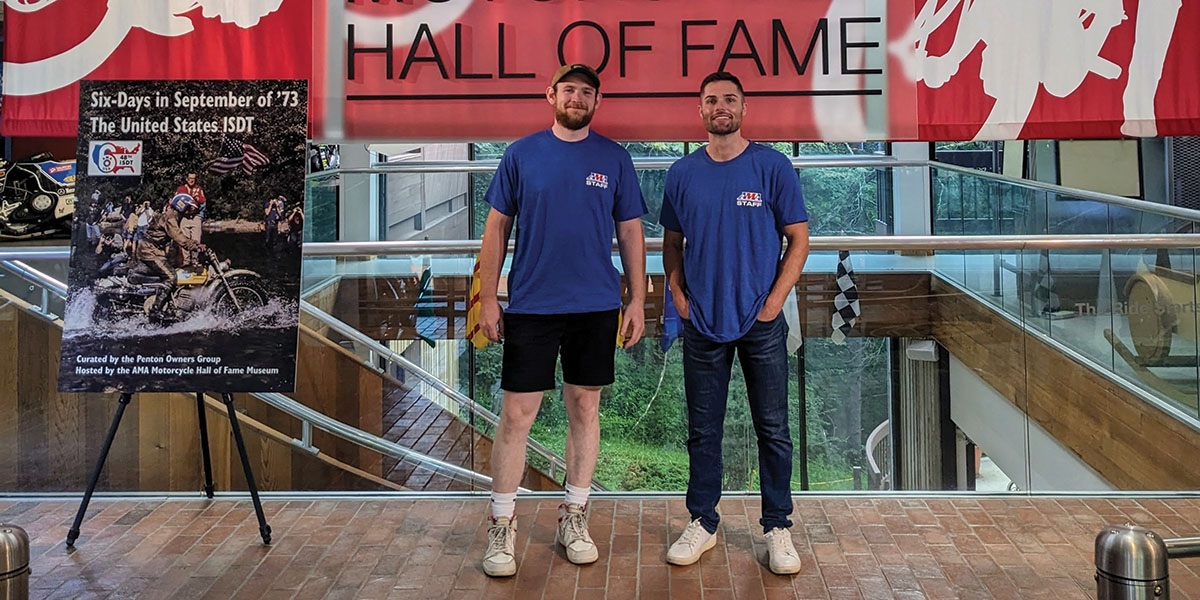Get to know the AMA’s new Government Relations Department staffers
October 3, 2023 (Story from October edition of American Motorcyclist)
By Keaton Maisano
When the AMA set out in May to restructure its Government Relations Department, it created an opportunity to make some changes to the department in a continued effort to deliver on its mission to protect the future of motorcycling.
With Government Relations Director Nick Haris spearheading the department, Zach Farmer (left) and Nick Sands (right) were recently hired in this first step of reconfiguration. Farmer has stepped into the role of Washington representative, and Sands’ position serves motorcyclists throughout the central states.
Based in Washington, D.C., Farmer is focused on heading up the AMA’s presence at the federal level, while Sands — a Colorado resident — is tasked with advocating for the interests of motorcyclists at the state and local levels within the Central United States.
Both Farmer and Sands are motorcyclists and have backgrounds in activism, making them perfect fits for their respective positions. But don’t take our word for it, listen to what they have to say…
AM: Who taught you to ride, and what are your earliest riding memories?
ZF: My earliest riding memory is my grandfather taking me to school on his Goldwing in first grade. I grew up next to his house in the country on a few acres and got a 50cc dirt bike and, briefly, a 125cc four-wheeler when I was around 7 years old.
My dad taught me to ride a bike on that property and was there when it came to dirt bike riding and showing me how to use the clutch on my TTR-125. Growing up, he was more interested in Mopar and muscle cars but got on board with motorcycles when I inevitably needed help working on one. (We spent last Christmas putting handlebars and exhaust on my Harley-Davidson.) He was, and still is, the first person to remind us before we ride that “motorcycles have no conscience; it will buck you off like a mule and not hurt its feelings.” That’s a pretty good message to remember before you think about that quick throttle twist.
NS: My dad taught my brother, sister, and me to ride dirt bikes when we were growing up. My parents refused to let us have anything bigger than pit bikes, so my earliest riding memories include finding ways to make pit bikes more exciting in whatever ways my brother and I could come up with.
AM: What is your favorite riding memory?
ZF: Pinpointing favorite memories is always a tricky exercise. I imagine picking the best moment or motorcycle is like asking someone to pick their favorite child. There might be one, but it’s hard to leave anyone out.
It’s easy to remember the first time I rode a motorcycle on the road, partially due to the excitement but also because it was December in North Carolina and there was snow on the ground. I don’t know if there was snow, but my memory of cold lets me think there were at least a few inches. In true high school fashion, my best friend Nathan gave me the keys to his Honda Rebel 250 to ride to McDonald’s. Naturally, I had to buy a motorcycle, and in May, I somehow convinced my parents that a CBR954RR was a responsible choice for a 17-year-old.
That led to years of Nathan and I riding our CBRs around Windy Gap, Va., between Roanoke and Smith Mountain Lake. Great memories for me, less so for him after a dozen or so speeding tickets.
Right next to that are memories riding around cornfields and through the woods of Yadkinville with buddies James and Jack, around North Carolina with my friend Councill during the pandemic, and then with Pat every time the Harley dealerships hand out free hot dogs here in DC.
NS: My favorite riding memory is my first attempt at amateur motocross racing in Colorado Springs. I had zero experience in racing and only about six months of track riding experience on a 250, but I was able to place high enough in the LCQ to qualify for the main event.
AM: How and why did you get into activism?
ZF: My high school civics teacher Mr. Kesler taught us about the process and role of government in such a compelling way that I decided to major in political science in college. I joined all the clubs in college and attended their meetings, Republicans and Democrats. It was interesting to hear from both sides and understand the ideology behind the beliefs. As I was weighing a decision on law school, I was fortunate to intern with folks who had worked on Capitol Hill. Their encouragement and network in North Carolina helped connect me with interesting candidates, a couple of jobs, and eventually, a job offer from Congressman Mark Walker to work in Washington.
NS: Having a career in activism is not something I ever saw for myself growing up. I had planned on going to law school after undergrad, so I chose a political science major to work on improving my analytical skills. However, life took over and I decided law school was not the right path for me, and I moved to Colorado to start as a legislative aide for the late-Representative Hugh McKean (HD51 – Loveland) going into the 2020 legislative session. Since that time, I found a passion for negotiating among different perspectives and advocating on behalf of common-sense policies.
AM: What can people expect in the way you pursue the AMA’s mission to protect the future of motorcycling?
ZF: We are fortunate to have an abundance of institutional knowledge at the AMA. It is great to have folks like AMA President and CEO Rob Dingman and Government Relations Director Nick Haris, who bring decades of insight to the government relations team. I look forward to following the direction of our Board of Directors and senior leadership to ensure we continue our advocacy work.
In my role at the AMA, I aim to use my recent experience as a staffer on Capitol Hill to make issues facing motorcyclists relatable. Staffers in Washington need information and an argument for why these issues are important to constituents and, in turn, why the agency, administration, or Member of Congress should engage. In my last government relations position, we identified creative ways to approach challenging issues.
I look forward to doing the same, working with the team at the AMA, engaging with our grassroots membership, and connecting with former colleagues on Capitol Hill, to protect the future of motorcycling.
NS: I have loved motorcycling from a young age, and that would not have been possible if not for others before me passing on their passion for motorcycles. People can expect that I will work to communicate what it means to be a member of the motorcycling community to policymakers, so they understand why it’s important to protect motorcycling’s future.
AM: How does a regionalized approach to the AMA Government Relations Department improve your ability to work effectively and positively impact AMA members?
ZF: Democracy in America is intentionally most effective at the state and local levels. Access to public officials on a state and local level, and the power those individuals have to enact change, is much greater than at the federal level. Our grassroots members are the best advocates for the AMA and the issues facing motorcyclists. At every level of government, officials must hear from their constituents. Connecting with these individuals and building those long-term relationships is much easier at the state and local levels. The regional approach to government relations assures that we make these connections and engage with state representatives before they seek higher office.
NS: A regional approach to government relations will improve my ability to effectively communicate with AMA members by creating opportunities for long-term relationship building with members, motorcycle activists, and policymakers on any number of issues so that problem solving is more proactive and less reactionary.
AM: Within the scope of your current position and the community you serve, what are issues that motorcyclists should be monitoring now and into the future?
ZF: At the federal level, we are monitoring autonomous vehicle and automatic emergency braking developments. As these autonomous features become standard on vehicles, drivers depend on cameras and technology to monitor blind spots and their surroundings rather than actively paying attention to the road. Congress, the Department of Transportation, and the National Highway Traffic Safety Administration must implement safeguards to protect vulnerable road users.
Access to public land and backcountry areas will always be an issue for Congress and the Department of Interior. As they designate more areas as wilderness or national conservation areas, off-road users, including motorcyclists, lose access to these spaces. Several coalition groups in Washington, D.C., focus on preserving access to this land for recreational use. We are working with these groups to include motorcyclists in these conversations.
NS: Maximizing safety for motorcyclists on the road is priority one, so riders should be monitoring rules and regulations developed around automated vehicle technology to ensure that technology properly identifies and responds to motorcycles in all traffic situations.
AM: How can AMA members be involved when it comes to motorcycle activism?
ZF: Advocacy works best at a state and local level. Supporting elected officials and candidates who share our enthusiasm for motorcycles is the best way to get involved. There are always opportunities to engage with politicians during town halls, public meetings, or on campaigns. The sooner we can build relationships with policymakers, the more likely they will become long-term allies of the motorcycling community. The first tab on the AMA website, “Rights” includes information, actions, and subscribe options to receive updates from the government relations team.
NS: Motorcycle activism can take a few different forms, but the easiest way to be involved with motorcycle activism is to treat others on the road or trail with the same respect we as riders expect. Additionally, staying actively engaged with policy and funding decisions made in your community can help ensure motorcyclists’ access and safety are protected.
AM: Is there anything you would like to say to AMA members?
ZF: I will emphasize again how important it is to get involved in advocacy on a local level. The mayor of my hometown is one of my former high school teachers. These connections exist all over the country and are incredibly valuable. The Government Relations Department exists to advocate in key areas while providing our membership with the knowledge, resources and support for independent advocacy.
I also encourage motorcyclists to find an opportunity to explore vehicles with new technologies. Knowledge of these autonomous features helps me be more defensive and aware on the road.
NS: I am very excited to represent AMA members and the future of motorcycling at the state-level and hope to connect with as many AMA members as possible in that effort.






